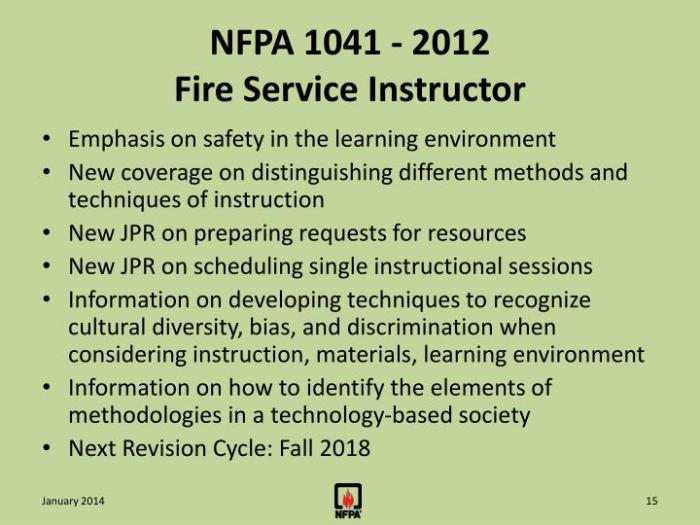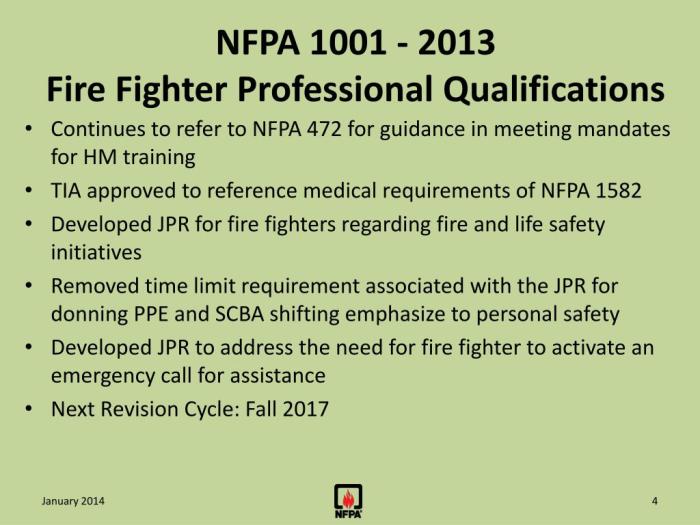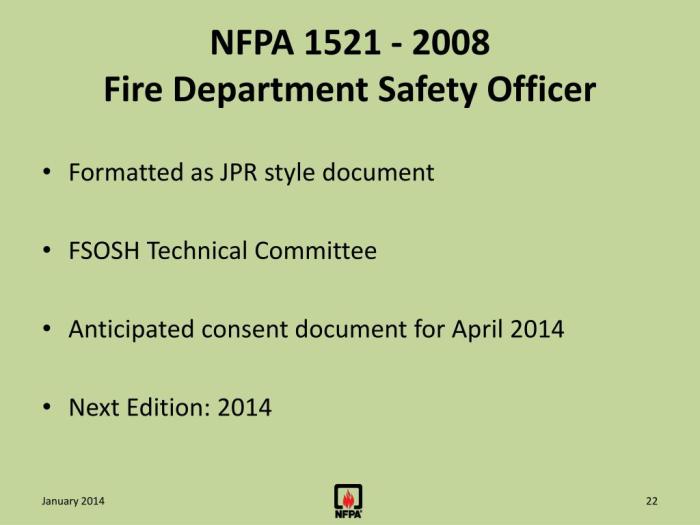Training and performance qualifications are specified in NFPA, providing a comprehensive framework for ensuring the competence and preparedness of firefighters. This meticulous system establishes clear standards for training and performance, empowering firefighters with the knowledge and skills necessary to safeguard lives and property.
NFPA’s rigorous standards define the minimum training and performance requirements for firefighters, encompassing various roles and responsibilities within the fire service. These qualifications are meticulously designed to ensure that firefighters possess the essential competencies to effectively respond to emergencies and mitigate risks.
Training Qualifications

Training qualifications are essential for firefighters to perform their duties safely and effectively. The National Fire Protection Association (NFPA) has established specific training requirements for different roles within the fire service.
Examples of training qualifications include:
- Firefighter I and II certifications
- Hazardous materials operations training
- Emergency medical services training
- Incident command training
It is crucial for firefighters to maintain up-to-date training qualifications. New technologies and firefighting techniques are constantly being developed, and firefighters must stay abreast of these changes to ensure they are adequately prepared for the challenges they may face.
Performance Qualifications
Performance qualifications are used to assess a firefighter’s ability to perform specific tasks. These qualifications are typically based on a combination of training, experience, and testing.
Examples of performance qualifications include:
- Ability to don and doff personal protective equipment (PPE) within a specified time
- Ability to climb a ladder and reach a certain height
- Ability to operate a fire hose and nozzle
- Ability to provide basic medical care
Performance qualifications are typically assessed through a combination of written tests, practical exercises, and simulations.
Specificity of Qualifications

It is important to have clear and specific training and performance qualifications. Vague or ambiguous qualifications can lead to confusion or misunderstandings.
For example, a qualification that states “the firefighter must be able to operate a fire hose” is too vague. It does not specify what size or type of hose the firefighter must be able to operate, or what level of proficiency is required.
A more specific qualification would state “the firefighter must be able to operate a 2.5-inch handline with a nozzle at a flow rate of 250 gallons per minute.”
Alignment with NFPA Standards

NFPA plays a vital role in setting standards for training and performance qualifications for firefighters. NFPA standards are based on the latest research and best practices, and they are designed to ensure that firefighters are adequately prepared for the challenges they may face.
For example, NFPA 1001, Standard for Fire Fighter Professional Qualifications, provides detailed requirements for training and performance qualifications for firefighters at all levels.
Adhering to NFPA standards for training and performance qualifications helps to ensure that firefighters are well-trained and prepared to perform their duties safely and effectively.
Continuous Improvement
Training and performance qualifications should be subject to continuous improvement. As new technologies and firefighting techniques are developed, qualifications should be updated and revised to reflect these changes.
Feedback and evaluation are essential for continuous improvement. Fire departments should regularly review their training and performance qualifications to ensure that they are meeting the needs of the department and the community.
FAQ Explained: Training And Performance Qualifications Are Specified In Nfpa
What is the significance of training qualifications as specified in NFPA?
Training qualifications specified in NFPA establish minimum requirements for firefighters to ensure they possess the necessary knowledge and skills to perform their duties effectively.
How does NFPA define performance qualifications?
NFPA defines performance qualifications as the measurable abilities and skills that firefighters must demonstrate to perform specific tasks or functions.
Why is it important to have clear and specific training and performance qualifications?
Clear and specific qualifications ensure that firefighters are adequately prepared for their roles, reducing ambiguity and confusion.
How does NFPA contribute to the development of training and performance qualifications?
NFPA plays a vital role in setting standards for training and performance qualifications, providing guidance and best practices for fire departments.